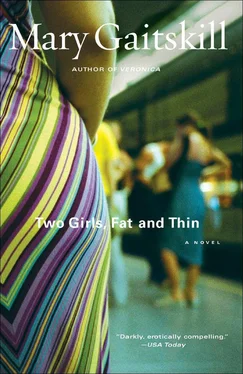Mary Gaitskill - Two Girls, Fat and Thin
Здесь есть возможность читать онлайн «Mary Gaitskill - Two Girls, Fat and Thin» весь текст электронной книги совершенно бесплатно (целиком полную версию без сокращений). В некоторых случаях можно слушать аудио, скачать через торрент в формате fb2 и присутствует краткое содержание. Год выпуска: 2012, Издательство: Simon & Schuster, Жанр: Современная проза, на английском языке. Описание произведения, (предисловие) а так же отзывы посетителей доступны на портале библиотеки ЛибКат.
- Название:Two Girls, Fat and Thin
- Автор:
- Издательство:Simon & Schuster
- Жанр:
- Год:2012
- ISBN:нет данных
- Рейтинг книги:5 / 5. Голосов: 1
-
Избранное:Добавить в избранное
- Отзывы:
-
Ваша оценка:
- 100
- 1
- 2
- 3
- 4
- 5
Two Girls, Fat and Thin: краткое содержание, описание и аннотация
Предлагаем к чтению аннотацию, описание, краткое содержание или предисловие (зависит от того, что написал сам автор книги «Two Girls, Fat and Thin»). Если вы не нашли необходимую информацию о книге — напишите в комментариях, мы постараемся отыскать её.
Review) create a haunting and unforgettable journey into the dark side of contemporary life and the deepest recesses of the soul.
Two Girls, Fat and Thin — читать онлайн бесплатно полную книгу (весь текст) целиком
Ниже представлен текст книги, разбитый по страницам. Система сохранения места последней прочитанной страницы, позволяет с удобством читать онлайн бесплатно книгу «Two Girls, Fat and Thin», без необходимости каждый раз заново искать на чём Вы остановились. Поставьте закладку, и сможете в любой момент перейти на страницу, на которой закончили чтение.
Интервал:
Закладка:
I left the steam room, my body relaxed and heavy. I didn’t bother to clutch my towel over my nakedness; I exposed even my horrible pubic hair. No one gawked. Only another fat lady glanced at me with mild curiosity. A skull with wavy blond hair was tattooed on one of her huge arms. The girl next to me carefully dried her breasts, gently patting the tiny rings that pierced both nipples. No wonder nobody looked at my cellulite, I thought, defiantly assuming poses that I knew would best reveal it. People are used to weirdness, inured to ugliness. It’s beauty we stare at, disbelieving and furious.
I lumbered into the street thinking perhaps I should try to find my mother. She was probably still living in Painesville, unless she was one of those old people who moved to Florida. It was also possible she had died and, since I’d changed my name, no one had been able to locate me.
As soon as I entered my apartment I ripped open a bag of potato chips and a bag of candy, turned on the TV, and sat before it, eating from both bags. The news was on. Two white teenagers who had beaten a black teenager to death with a baseball bat had been fined $100 for misconduct and black people were demanding a retrial. The families and neighbors of the white teenagers were outraged by this, saying that they were being unfairly judged because they were white. A bleached blonde with a huge wad of gum in her mouth spoke to a newsman’s microphone. “Cuz I known these guys all my life,” she said in defense of the white boys. “They’re the nicest, most unprejudice people in the whirl.” I hit the remote control button. On the next channel a talk show featured schoolchildren who said they’d been sexually abused by their allegedly Satan-worshipping teacher; they were confronting the accused teacher. The parents of the children stood behind their seated offspring, gripping the backs of their chairs, their faces held in strangely combined expressions of anger, disgust, prurience, and awareness that they were on TV
“And so Miss Peatrosinski,” said the host, stalking the tense young teacher with his mike, “what do you have to say to that? ”
The teacher blinked rapidly and nervously rubbed the corner of one deeply shadowed eye. She said, “This is nothing but a witchhunt based on gossip and faulty—”
A child of twelve or so leapt to his feet and shouted, “I wanna say something. How do you think we little kids could make up stuff as dirty as that? How would we know about Satanism and all that other stuff?”
The audience roared in approval, the children cheered and shook their fists in the air.
I imagined my mother in a room watching television, alone with memories of a rapist husband and a daughter who hated her. I remembered my father as I used to find him sometimes when I returned from school, alone in the darkened house, feeling the hairs in his nose with his thumb, his eyes looking as if he didn’t know where he was. His face would come to life as he saw me, a familiar reference point moving through the room. I remembered the way he would lie in the dark in his room before dinner, listening to the soft music emerging through the static on the radio. Sometimes I’d be in the hall and he’d appear, his oiled hair traveling in conflicting directions on his head, his face set like a carving, his eyes totally bewildered. On one such occasion he said to me, “I had a dream. A dream I was back in Michigan at the Bowlarama. Mama and Aunt Cat were alive and happy, and there were flowers everywhere.” He put his finger to his nose, turned up a nostril and tenderly stroked the hairs.
My poor father. My poor, poor father. Pity spread through my body, paralyzing me. My father had lived and died in terrible pain. My mother might be lost forever. Anna Granite had not saved me.
The phone rang. I stared in the direction of the ringing. It was my mother. It was one of those instances you read about in Reader’s Digest ; she had been psychically penetrated by the strength of my thoughts and was now trying to reach me. I stood up. Except how would she know my number? I sat down. There were lots of ways! I leapt up and headed for the phone, which immediately stopped ringing. “Shit!” I slammed my fist on the wall and the ringing began again. I dove at the phone with tears in my eyes, barely able to control my voice as I answered hello.
“Hi,” said the thin little voice. “It’s Justine Shade. Remember me?”
Chapter Nineteen
Justine looked at the Medicaid billing forms before her, fearful that she had filled them out incorrectly but unable to tell how. When she looked at the numbered instructions, boxes to fill in and various codes, she could not see them as specific abstractions with easily understood meanings which began and ended when you put the obvious information in the box. The grid of green ink that made up the form seemed rather the opening of a hellish labyrinth at the end of which sat checks in envelopes made out to Dr. Winkgard. She steeled herself and filled in a code of numbers; immediately the numerals sent out invisible threads attaching them to a machine of paper that ground along on a cloud of thoughts, the now totally abstract thoughts of whoever had come up with this method of defense against a cruel and exorbitant medical system.
Her mind had been moving in this psychotic direction all morning, and it was beginning to alarm her. Even worse, it seemed as though other people could see the distressed twistings and turnings in her head. Patients would approach the desk to request an appointment or to pay their bill; she would look at them and she would suddenly see their facial expressions and body movements as though through the tiny end of a telescope, leading to an infinity of personality, and then beyond personality to a place out of which the personality grew in a thick tough stalk, a place unreadable by even her grossly heightened perceptual mechanism. She would look at the appointment book, and see there a list of names symbolizing people, people who were each as complex as the one standing before her and yet reducible to a list of squiggles in an appointment book anyone could buy in any stationery store. Shaken, she would fill out an appointment card and hand it to the patient and see on her face a vague expression of discomfort and puzzlement, as if she’d registered Justine’s weird consternation. When one of them asked her a question and sensed her groping confusedly for an answer, he looked past her to Glenda and said, “Perhaps you could tell me, Mrs. Winkgard?” And Glenda’s voice sailed forth, cheerfully acknowledging the chaos that so stupefied Justine, then sweeping it into a corner with the brisk broom of her voice, neatening and simplifying, answering the question.
Probably it was obvious to everyone, on a deep level, that Glenda was a conduit for the forces of order, rationality, and strength, and that she, Justine, was a mere appendage, useful only insofar as she was a conduit for Glenda. Further, it seemed that this had been true all her life and would probably always be true, no matter how many articles she wrote or how old she got. And it was only ten thirty! How was she going to get through the day?
She turned to Glenda, who was sitting beside her doing some paperwork, her furrowing dewlaps giving her the appearance of a masticating little animal. Surely Glenda would realize that something was wrong with her soon; she thought she’d better comment on her condition so that she wouldn’t appear too far gone to have noticed it herself.
“Glenda,” she said as casually as possible, “do I seem to be acting weird today?”
“No. Are you feeling well?”
“I don’t feel sick. I just feel strange.”
Glenda put aside her paper and looked at her alertly. “Strange how?”
Читать дальшеИнтервал:
Закладка:
Похожие книги на «Two Girls, Fat and Thin»
Представляем Вашему вниманию похожие книги на «Two Girls, Fat and Thin» списком для выбора. Мы отобрали схожую по названию и смыслу литературу в надежде предоставить читателям больше вариантов отыскать новые, интересные, ещё непрочитанные произведения.
Обсуждение, отзывы о книге «Two Girls, Fat and Thin» и просто собственные мнения читателей. Оставьте ваши комментарии, напишите, что Вы думаете о произведении, его смысле или главных героях. Укажите что конкретно понравилось, а что нет, и почему Вы так считаете.












